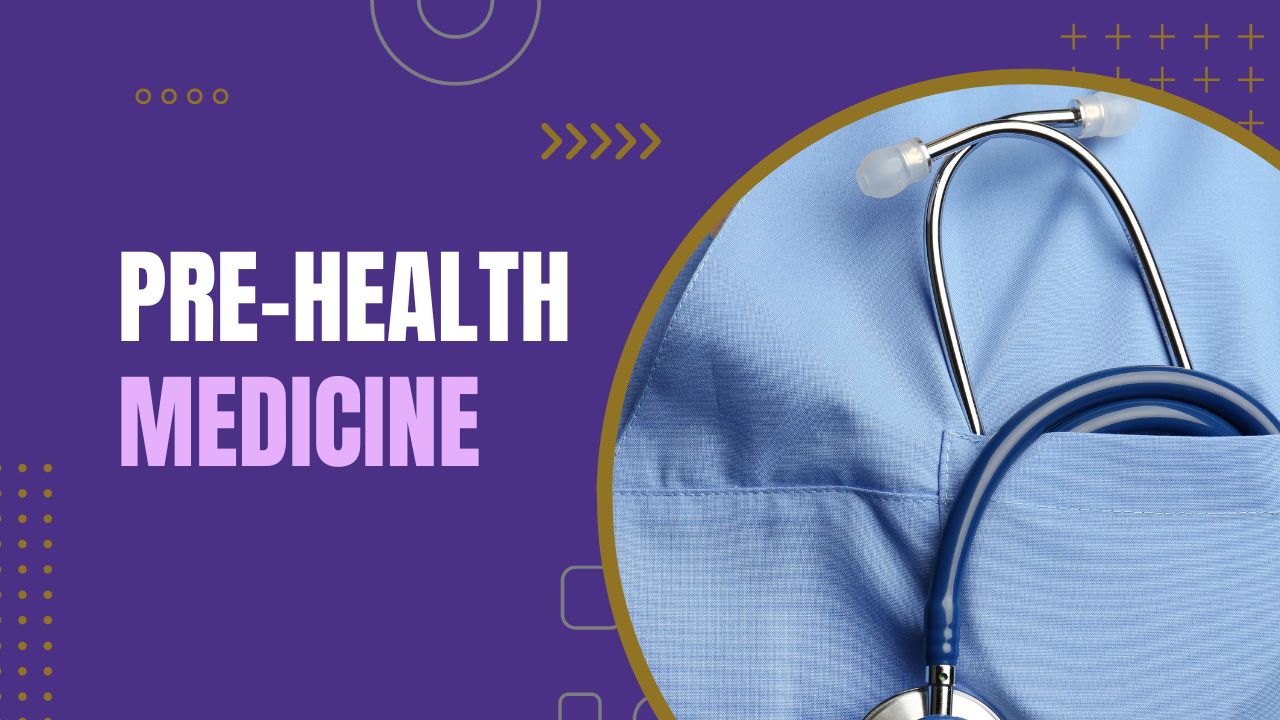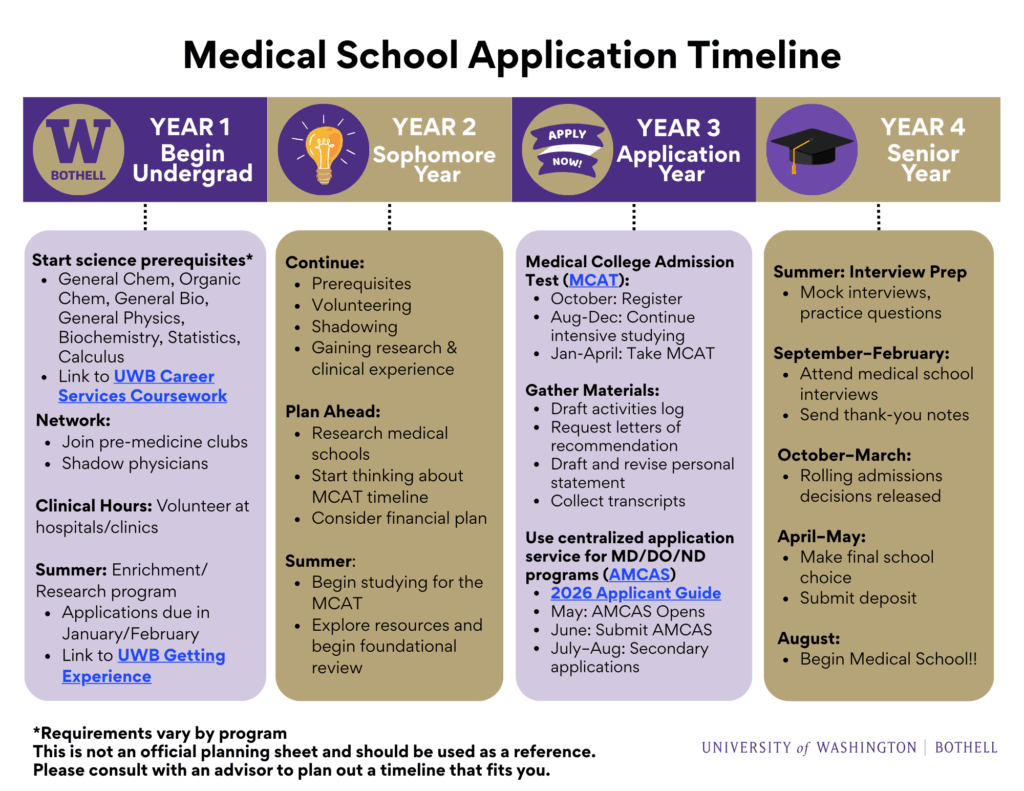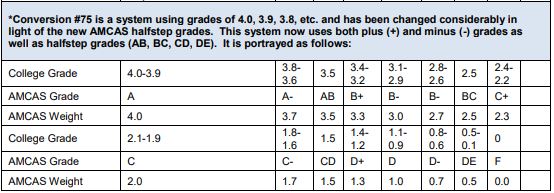Medicine

Overview – Types of Medical Practice
There are three different types of medical practice to consider:
- Allopathic – MD
- Naturopathic – ND
- Osteopathic – DO
- Podiatric – DPM
Students apply more than a full year in advance of starting medical school, which typically begins in the fall. For example, those applying in Spring/Summer 2026 are aiming to start in Fall 2027.
Applications
Application Timeline
Requirements vary by program. This is not an official planning sheet and should be used as a reference. Please consult with an advisor to plan out a timeline that fits you.

- Start science prerequisites based on your placement/prior coursework – General Chem, Organic Chem, General Bio, General Physics, Biochemistry, Statistics, Calculus – UWB Career Services Coursework
- Network: Join pre-medicine clubs, shadow physicians
- Clinical Hours: Volunteer at hospitals/clinics to gain exposure and experience
- Summer: Enrichment/Research programs – Applications due in January/February – UWB Getting Experience
- Continue: Prerequisites, volunteering, shadowing, gaining research & clinical experience
- Plan Ahead: Research medical schools, establish MCAT timeline
- Consider financial plan
- Summer: Begin studying for the MCAT – Explore resources and begin foundational review
- Medical College Admission Test (MCAT):
- October: Register for the MCAT
- Aug-Dec: Continue intensive studying
- Jan-April: Take MCAT
- Gather Materials:
- Draft activities log
- Request letters of recommendation
- Draft and revise personal statement
- Collect transcripts: Download transcript matching forms
- Use centralized application services for MD/DO/ND/DPM programs
- Submit all materials
- Identify the schools to which you are applying
- Adhere to due dates within those systems
- Summer: Interview – Practice through mock interviews, review possible questions
- September–February: Attend medical school interviews, send thank-you notes
- October–March: Rolling admissions – decisions released!
- April–May: Make final school choice, submit deposit
- August: Begin Medical School!!
Primary Applications
Submit the primary application depending on the type of medical school you wish to attend.
- AMCAS (Allopathic schools)
- AACOMAS (Osteopathic schools)
- NDCAS (Naturopathic schools)
- AACPMAS (Podiatric schools)
Visit the Apply page for more on prerequisite coursework and grades, transcripts, activities, personal statements and letters of recommendation in general.
Prerequisite coursework and grades specific to Medical Schools

Here is an accessible version of the Grade Conversion Chart.
Use this grade conversion chart to see how AMCAS will calculate your UW grades. Remember that they will consider both your BCPM (science) GPA and your AO (all other) GPA in addition to your overall GPA, and all attempts of repeated courses are counted. The AMCAS Grade Conversion Guide is for personal reference. Do not enter the estimates on your AMCAS application; you must enter course information as it appears on your official transcript.
Transcripts specific to Medical Schools
The Centralized Application Service (CAS) requires that you download a Transcript Request Form to be submitted with each of your transcripts. This form includes your CAS ID number, so it is an essential piece in matching your transcript to your application and avoiding unnecessary delays. Download the form, fill it out, and upload it with your transcript request so the school can attach it to your transcript when they submit it to the CAS.
Activities specific to Medical Schools
The CAS will sometimes allow you to designate 3 “most impactful” experiences on your activities log. For these 3 activities, you will be granted more character space for your reflection on how the experience impacted your growth/development as a healthcare professional/prospective physician.
Letters of Recommendation/Evaluation specific to Medical Schools
Letters of recommendation/evaluation should come from individuals who can speak about characteristics such as your academic ability, interpersonal skills, clinical or research experiences, etc. Letters must be submitted through the CAS. See AMCAS Letters of Evaluation/Recommendation service for details). Applicants are also advised to check with each of their chosen schools to determine specific information that should be included.
Secondary Applications
After reviewing your primary application through the CAS, schools may invite you to submit a secondary application specific to that school. Secondary applications usually include more essays and an application fee for the school. This is a necessary step to proceed with your application. You should plan to submit the secondary application as soon as possible to secure an interview.
Resources
- Application timelines for medical schools
- Guidelines for your letters of evaluation (to give your recommenders)
- Information about post-baccalaureate programs
- AAMC’s Anatomy of an Applicant guide and profiles of successful applicants
- Most Medical Schools will conduct interviews as part of the secondary application process. Students are advised to prepare for their interviews by scheduling a mock interview with the Health Professions & Natural Science Pathways Manager. Students should also become familiar with the type of questions that may be asked during their interview.
- AAMC’s Interview Resources for Medical School Applicants includes a comprehensive guide to navigate the medical school interview process.
- Five Steps to Preparing for Your Medical School Interview (The Student Doctor Network)
- The Types of Medical School Interviews (MSHQ)
- The Multiple Mini Interview (The Savvy Pre-Med)
- Samples of interview questions: UW Medical School Interview Questions, Ten Commonly Asked Questions (MSHQ)
- Bastyr University – Naturopathic (ND) – Kenmore WA
- Pacific Northwest University of Health Sciences – Osteopathic (DO) – Yakima WA
- University of Washington – Allopathic (MD) – Seattle WA
- Washington State University – Allopathic (MD) – Spokane WA
- AACOM (American Association of Colleges of Osteopathic Medicine)
- AAMC Store – Resources including MCAT prep, medical school information, managing your finances while in medical school, etc.
- Aspiring Docs – AAMC (Association of American Medical Colleges)
- ChooseDO.org Explorer– Database of Osteopathic medical schools
- Core Competencies for Entering Medical Students
- MSAR (Medical School Admissions Requirements) Database of medical schools, prerequisite information, acceptance numbers, etc.
- Pre-Med Calendar
- Step Into Podiatry
- The Student Doctor Network
- Selecting a Medical School – Important questions to ask
- Paying for Medical School
- AAMC – FIRST (Financial Information, Resources, Services and Tools)
- Cost of Applying to Medical School
- Education Loan Finance – Medical School Loan Refinancing
- Fee Assistant Program (FAP) – Financial assistance when applying to medical school.
- HRSA – Health Resources & Services Administration – click on “Loans & Scholarships”